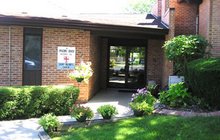
A short reflection on the Gospel for Proper 9C 2007
Luke 10:1-11, 16-20
When I was little I remember a certain chair that belonged to my great-grandmother. It was a desk chair with a curved wood back, arms, and seat; a swivel chair on wheels. My brothers and I loved to twirl in that chair, round and round we’d spin. But, because it was old it wasn’t the hydraulic lift and swivel like desk chairs are today. No. This one was like a nut and bolt: the seat was a big nut that screwed onto the threaded bolt-like base. So, if we twirled enough in one direction the seat would screw right off the base and we’d end up on the floor.
My mother ended up with this chair and moved it with her everywhere, for decades. Over the years it was painted every color of every generation including, as I remember it, yellow – and then – olive green.
A few years ago, after my mother died, I found that old chair stuffed into my mother’s storage locker, broken in several pieces. She couldn’t bear to throw it out. But, now it was neither a cherished antique, not an heirloom nor a legacy, just a broken chair. So, I threw it out.
In our Gospel this morning Jesus sends the “appointed” out in pairs, seventy some people. Their task is to continue the ministry of Jesus, to go where he had intended to go and do what he had intended to do. They are to offer a way of passing down from one generation to the next an experience of Jesus. They are to offer folks, long after Jesus has gone, a precious heirloom of God’s love poured out in Christ, given for us.
What they are offering is the gift of relationship.
And, so, these appointed ones are to travel light. No need to carry any baggage. Just go and be present for the people they meet. Visit with them. Share stories. If they are welcomed, wonderful. A legacy will begin; a family history of God’s people will be shared and lived into in a new way. But if they are not welcomed, don’t worry. Move on. Don’t carry that baggage either, the baggage of being rejected or ignored. It’s ok. God’s
work will happen somehow, someway. Just move on and try again.
Of, course it will be difficult work at times. Not only will people reject the appointed ones but some might become hostile: “scorpions, snakes, and wolves” will come out to “attack” and “bite.”
Jesus’ advice to such threats: just keep going. The kingdom of God is near.
By their presence and with the intent of their hearts, these appointed ones bring with them the kingdom of God. The kingdom of God is like a precious heirloom; it grows richer over time. The kingdom of God is like a priceless well aged piece of furniture, growing in value the longer the kingdom of God resonates around us. And like antiques which carry the stories of those who have used it, the kingdom of God becomes a part of our very being. And we become a part of the kingdom.
We, Christians today, are the appointed ones. We are charged to go out and share this heirloom with others. This heirloom, our Christian faith, is like a rich antique table. Around this table we invite all to join us, to come and share in the feast. We bring nourishment to the hungry, those who are starving, spiritually, or physically.
Today’s Gospel cautions us; We bring God’s love - we don’t need to bring everything. It reminds us that some of the things we might cling too are really not needed. They may feel like part of our history and our tradition, but being old doesn’t necessarily make them valuable. Some things, like that old broken chair, don’t need to be saved, stored, and moved around just for the sake of saving them. Some things just need to be discarded.
Religion is like that too. Sometimes we need to discard particular ways of understanding our faith. Often the way we understand God and what God is doing in the life death and resurrection of Jesus is bound by the culture and society we live in. Many of the ways we understand God are human constructs, they can be helpful but not always “necessary” – God is mystery.
So, this gospel helps us in our housecleaning. What’s important is to bring only the most valuable and necessary pieces – ourselves, and God’s love. Our Collect for the Day sums this up: O God, you have taught us to keep all your commandments by loving you and our neighbor: Grant us the grace of your Holy Spirit, that we may be devoted to you with our whole heart, and united to one another with pure affection, through Jesus Christ our Lord.



